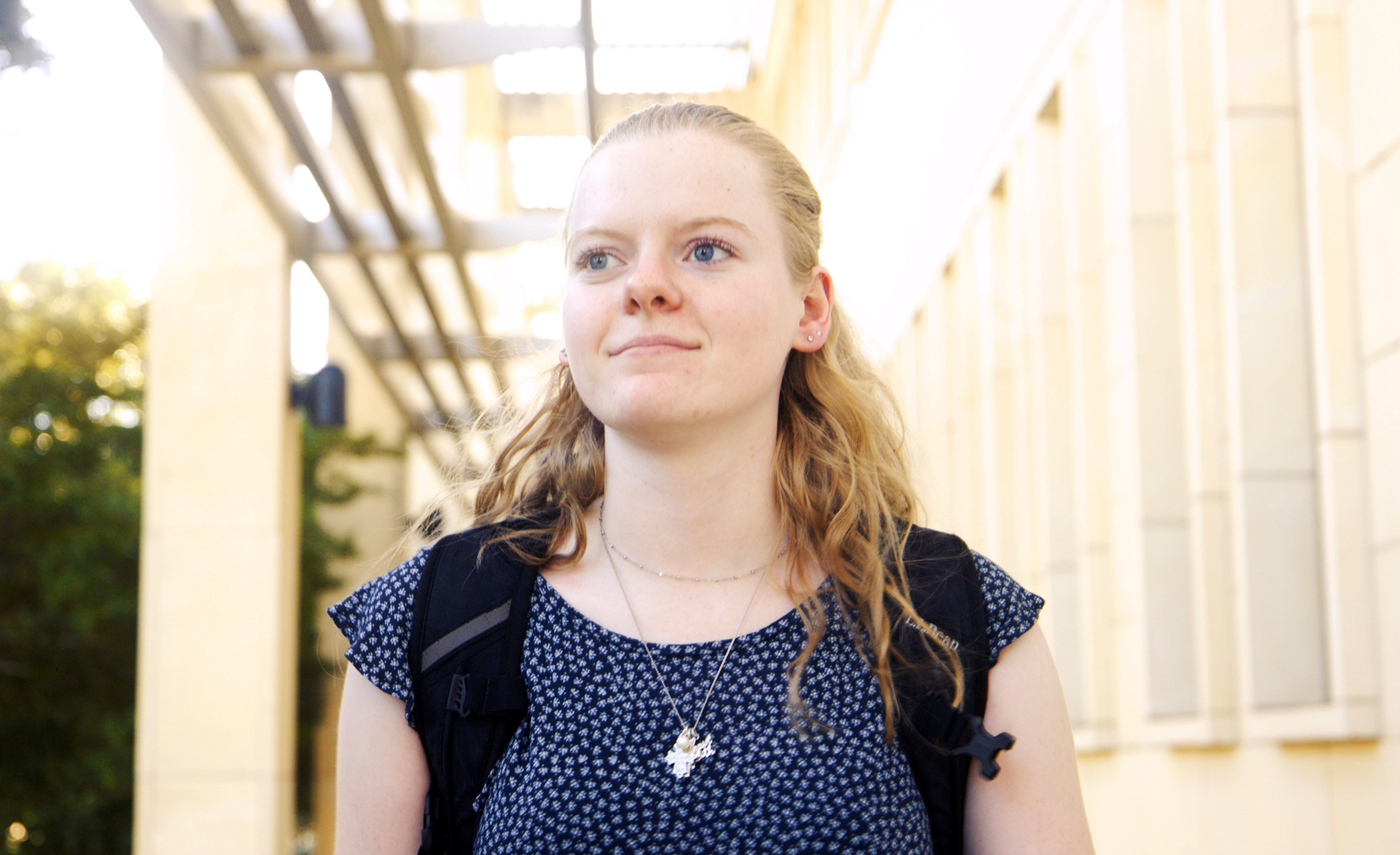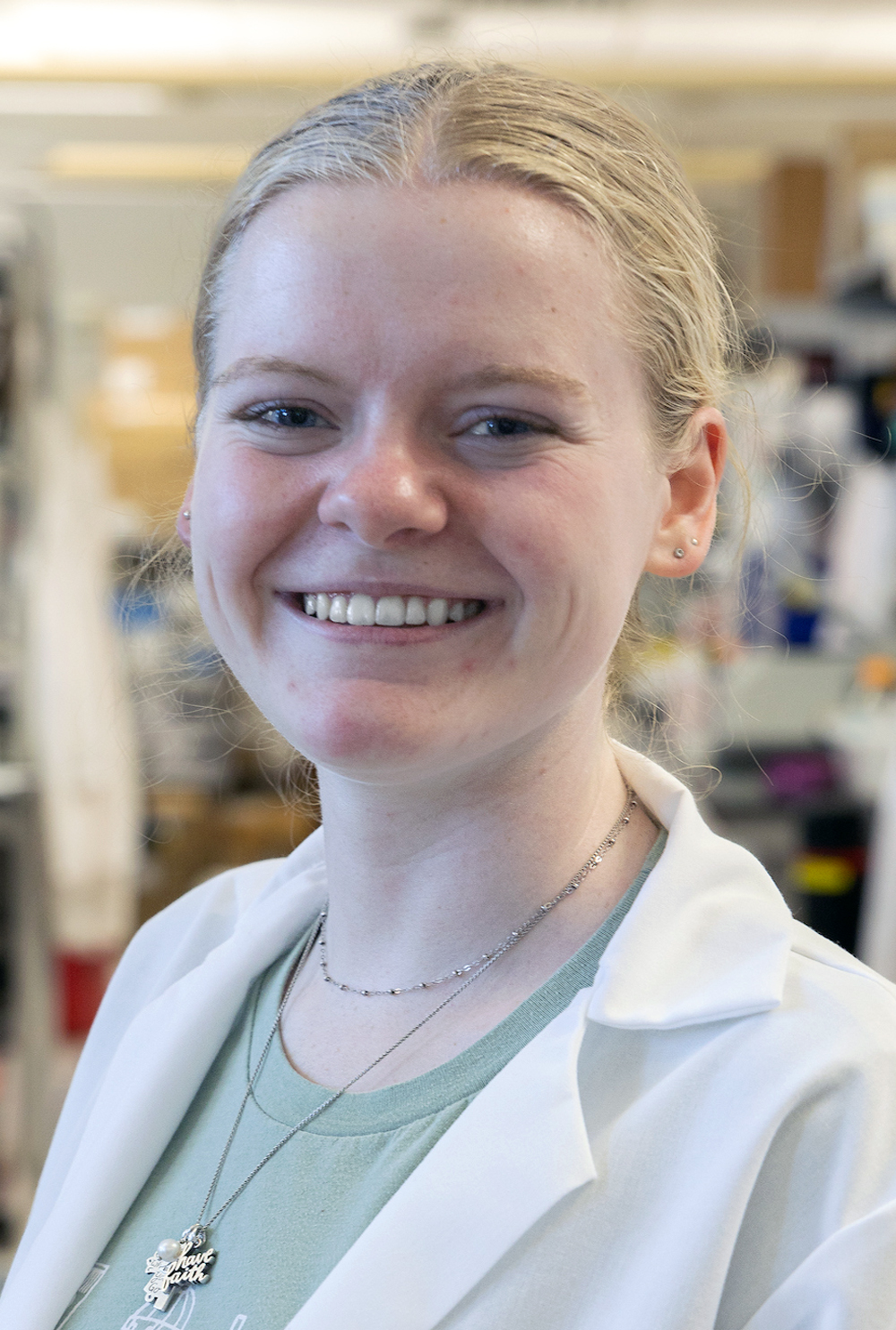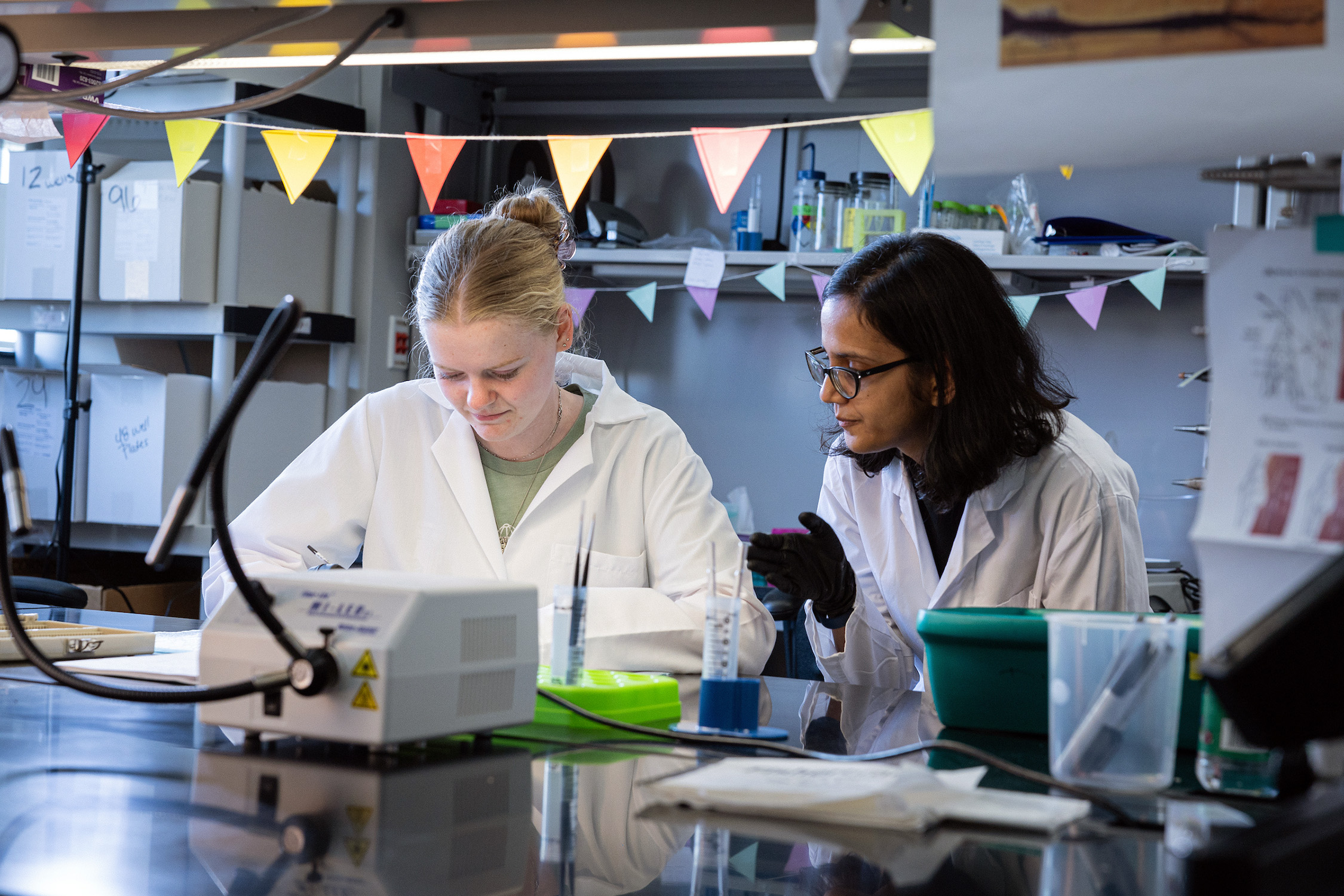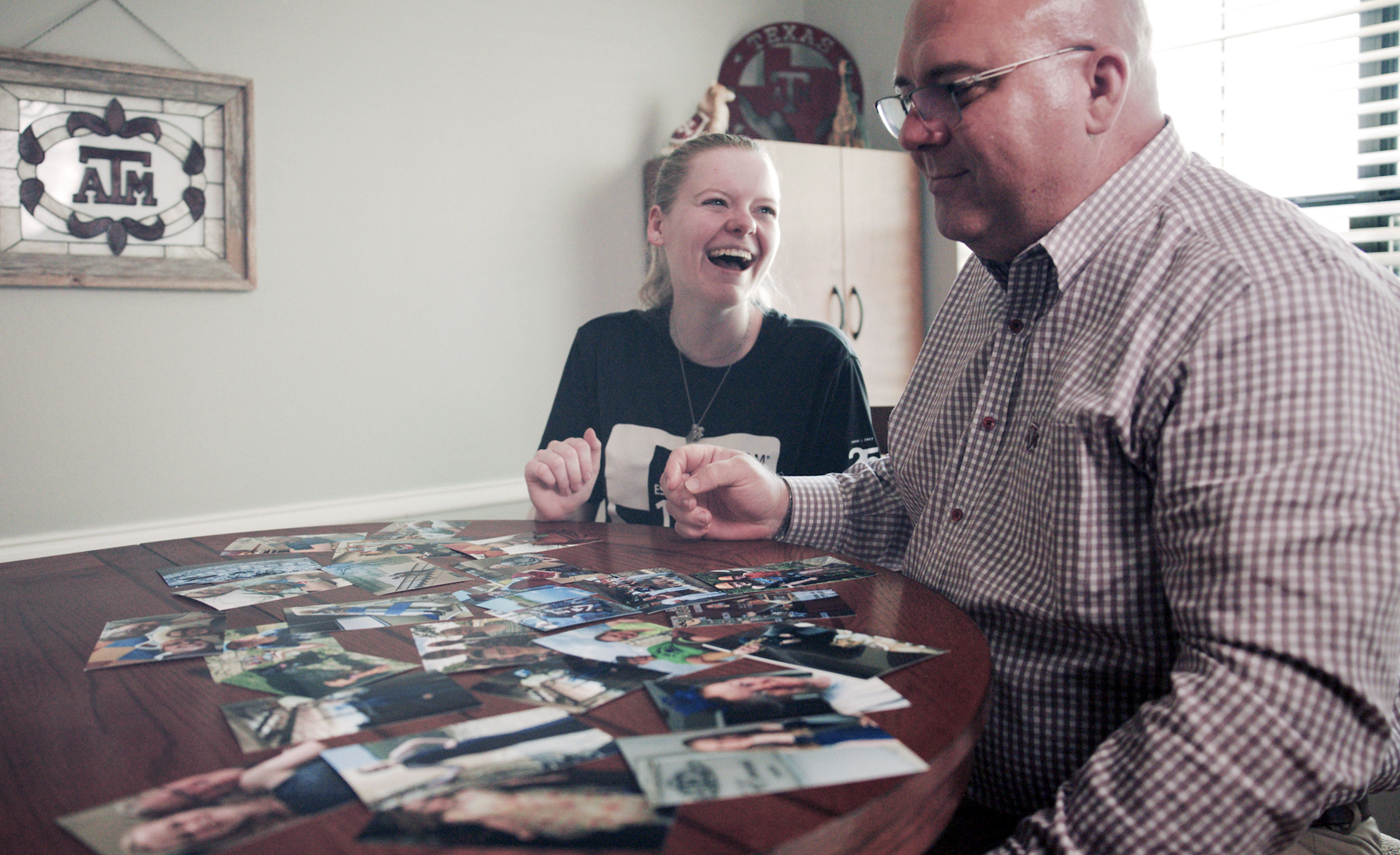
Abbi Evans ’26 has been interested in medicine for as long as she can remember. As a junior allied health major at Texas A&M University, she’s pursuing her dream to become a histotechnologist with a renewed sense of purpose, buoyed by the past 10 months spent as an undergraduate researcher in Dr. Jennifer N. Dulin’s laboratory in the Department of Biology studying spinal cord injury and her own uniquely personal take on the phrase “hands-on experience.”
Evans describes her first 16 years of life as “completely normal and healthy” growing up in Corpus Christi and participating in marching band, volunteering in service organizations and being highly involved in academics. Her life changed forever in January 2021 after a routine eye exam at a local mall led to an MRI that revealed three brain tumors characteristic of a rare genetic disorder known as NF2-related schwannomatosis (NF2-SWN), which is caused by the lack of a tumor suppressor in the nervous system. The incurable disease occurs in about one in 40,000 people and allows noncancerous tumors to form anywhere nerves are present, primarily in the brain and spine. A subsequent MRI found a fourth tumor growing within Evans’ spinal cord — one so large that it was compressing her spinal cord and causing headaches, among other symptoms.
“We were told that it needed to be removed immediately and that it would be a fairly risky procedure,” Evans said. “In February 2021, my family and I traveled to Houston for surgery. I was admitted to the emergency room on a Sunday evening, and the surgery was performed the next day."
The Perfect Storm
That risky procedure happened to coincide with Winter Storm Uri, a historic snow and ice event that gripped the entire state of Texas and caused the worst energy infrastructure failure in state history. During his preoperative consultation with the family, Evans’ neurosurgeon reassured them he would find a way to get to Children’s Memorial Hermann Hospital even if the roads were closed and he had to walk. He made good on that promise, trudging a mile and a half in the snow on foot to perform Evans’ surgery, which was successful but resulted in her losing strength, mobility and sensation in the lower half of her body.
“I couldn't walk, I couldn't even sit up by myself very easily, so I lost a lot of function very quickly, and that was pretty shocking,” Evans recalled. “Then I was transferred to TIRR Memorial Hermann in Houston, which is the best [facility] in the country for inpatient rehab. I was the ninth pediatric patient they had ever had. They had just opened up their pediatric unit, so I was still kind of like the guinea pig.”
Evans spent five weeks accompanied by her mom at TIRR Memorial Hermann, recovering and relearning how to walk and perform other daily tasks. Therapy was intense and physically, mentally and emotionally demanding and was compounded by fatigue, homesickness and constant pain. But on March 25, 2021, Evans walked out of TIRR Memorial Hermann unassisted and just in time to attend her junior prom. She then continued the year-long process of outpatient therapy from Corpus Christi.
“Walking is such an instinctual thing that you don’t think about until you can’t,” Evans said. “People with my type of spinal cord injury have a one in three chance of returning to walking in the community. There are still many things that I struggle with today that a normal person wouldn’t, but I am very blessed to have gotten back to this point and regained as much as I have.”
Walking The Walk
Evans now hopes to return the favor as an undergraduate researcher in the Dulin lab, which specializes in neural regeneration in mice and rat models and how neural progenitor cell grafts can improve motor and sensory function after a spinal cord injury.

“Abbi is such a joy to have in the lab,” said Dulin, an associate professor of biology and a former TIRR Foundation Fellow. “She is making outstanding academic progress and contributing to spinal cord injury research as someone who knows all too well what it means to overcome the odds and not only live with but also thrive with such a rare disorder. Aside from making impactful contributions to our research, she’s really educated all of us about NF2-SWN and raises awareness for individuals living with this condition.”
When she initially joined the lab in February after emailing Dulin on a whim when she came across her lab website based on Dulin’s affiliation with Texas A&M LAUNCH, one of Evans’ first projects was classifying spinal cord injury studies done through the National Institutes of Health during the last 15 years to help determine trends in funding. She also has assisted with cell counting to gauge the success of graft integration as well as studied forelimb function to determine most effective treatments.
“It's been really interesting to learn more about the science behind the treatments that I've actually had or used, including the reasons behind the side effects or why the doctor prescribed this for me” Evans said. “Realizing that these treatments can and have helped people like me has been fascinating.
“There’s just so much we don’t know about the spinal cord. SCI research has been going on for years and years, but we're discovering new stuff all the time. One day, these treatments can help people like me, and I think it’s really cool to be a part of that.”

Lifelong Recovery And Support
For Evans, it’s a complex twist on the “physician, heal thyself” mantra. Even though she’s made a successful recovery from spinal cord surgery, she acknowledges that NF2-SWM is a disease she’ll have to deal with for the rest of her life. “There is a good chance I will have more surgeries in the future as well as struggle with other health issues,” she added. In addition to living with a microscopic portion of remaining tumor within her spinal cord, Evans has two vestibular schwannomas on her acoustic nerves along with a meningioma in her brain that all have to be monitored every six months. And that’s just scratching the surface of what the outside world doesn’t see.
“In my right side from the surgery site down, I have no sensation,” Evans said. “I can't feel pain or temperature, so that's something I have to monitor. Then in my left side, I lack proprioception, which is knowing where your body is in space. One of the tests that's normally done on me is your toe going up or down without looking at it, and I really don't know if my toe is going up or down. It's just the things you don't think about. Once you lose it, you're like, ‘Oh my goodness, my body was doing so much for me without me even realizing it.’”
Evans says her spinal cord injury and lifelong recovery “100% influenced me to start researching spinal cord injury” — a direction she doubts she would have gone without having this experience. She’s quick to add that it’s one she couldn’t have pursued without her family, including her mom Christy, her younger brother Nik and her dad, Ed ’95, an associate vice president in the Texas A&M Division of Technology Services. Nik is set to graduate from high school a semester early in December and will be joining his sister at Texas A&M as a Mays Business School freshman and member of the Fightin’ Texas Aggie Class of 2029.
“My family has been so supportive through my whole neurofibromatosis diagnosis and also just dealing with all of my spinal cord injury symptoms,” Evans said. “That comes with a lot of uncertainty and unknown. I really value that, and I couldn't have done it without them.”

Full-Circle Future
In addition to working in the Dulin lab, Evans is a student assistant in the Department of Epidemiology and Biostatistics within the School of Public Health. She plans to pursue a career in histology, which involves looking at tissues under a microscope — another reason she relishes being in a setting where she’s gaining valuable experience in the techniques she’ll be using throughout her professional life, with the built-in bonus of helping people.
“That’s the main goal of medicine — to help people — and that’s a really important aspect of my undergrad research,” Evans added. “That is the end goal — to develop these stem cell treatments to the point where they can be commercialized and used to help others. Obviously, we're still a ways from that point, but I think it's really cool, knowing that there are people whose stories I don't know who have suffered in a similar manner as I have. They might be helped one day, and I get to be a part of that. I think that's the most fascinating part to me.
“Histotechnologists are the people who prepare tissue samples to be looked at and diagnosed by the pathologist. Someone did this for my tumor during my surgery, so I think it’s a fitting full-circle moment.”
